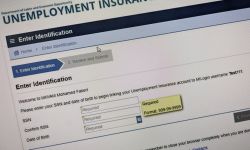Michigan changed unemployment rules. Now 648,000 may have to repay benefits


Feb. 7, 2022: Feds relax rules for workers ordered to repay Michigan unemployment benefits
Jan. 14, 2022: Michigan unemployment fraud now at $8.5B. Legislators have more questions.
Oct. 25, 2021: Michigan’s embattled unemployment agency gets third director in 11 months
Sept. 28, 2021: Michigan Republicans propose ‘fix’ for state unemployment agency
Nearly one-fifth of the Michigan residents who received unemployment payments during the pandemic are now learning their eligibility for jobless benefits didn’t meet federal standards.
Michigan officials will reevaluate claims filed by 690,092 people. The vast majority — 648,000 — will have to confirm their jobless status from a different set of criteria and may learn they weren’t eligible for funds they already received.
Another 42,092 who “were initially denied … now may qualify for benefits,” said Lynda Robinson, spokesperson for the Michigan Unemployment Insurance Agency.
Related:
- Michigan unemployment benefits secure for those who ‘followed the rules’
- What to do if you are asked to re-certify for Michigan unemployment benefits
- Michigan: Flagged unemployment recipients won’t have to repay money
- Most Michigan restaurants cut hours this summer due to staff shortages
- Michigan unemployment agency resumes in-person office visits
- Amid worker shortage, Michigan to restore job search rule for jobless aid
- Unable to fill its big hotels, Detroit hopes for business travel rebound
As the department launches the review, the situation revives ongoing concerns about the unemployment system during the COVID-19 pandemic, prompting the Legislature to make plans to bring UIA staff back before the House Oversight Committee.
“There’s just a number of issues that we’ve seen at the agency that need to be resolved,” Rep. Steve Johnson, R-Wayland, told Bridge Michigan.
The problems range from repeated system crashes and widespread fraud investigations that froze benefits for hundreds of thousands of residents to delays in processing claims that continued for months after the state reached its unemployment peak in April 2020.
Most recently, the state reopened its unemployment offices on a limited appointment basis, following months of frustration among bipartisan legislators who said their staffs still had to help constituents navigate the bureaucracy to get paid.
“There’s clear mismanagement at the UIA,” Johnson said.
The latest problem comes after Michigan officials learned their application criteria for Pandemic Unemployment Assistance payments weren’t authorized by the U.S. Department of Labor.
PUA was created in March 2020 by the $2 trillion CARES Act to provide jobless benefits to people who do not qualify for the state’s unemployment system. They include part-time, self-employed and so-called “gig” economy workers.
PUA payments totaling $5.7 billion have been made in Michigan through the first week of July — an amount equal to the payouts through the traditional unemployment system.
In July 2020, just under 1 million people were receiving PUA benefits in Michigan. A year later, that total is about 391,000.
Recipients of the PUA benefits received an average of $216 per week in Michigan, compared to the weekly average of $312 for regular unemployment benefits.
In late June, though, the state mailed three-page letters to recipients warning they may not have been eligible for the payments because they didn’t meet criteria acceptable to the Department of Labor.
Eleven criteria were on the agency's list in 2020, then it added three more in February 2021.
But when the PUA program was launched in Michigan, it included “four reasons that were not provided or approved by the (Department of Labor),” according to the state’s letter.
Those unapproved reasons were used in the state for both initial claims and continued certification. The letters inform recipients the following reasons can no longer be used:
- Your work hours were reduced as a direct result of COVID-19.
- You are seeking part-time employment and affected by COVID-19.
- You have insufficient work history to qualify for regular unemployment compensation and are affected by COVID-19.
- You are unemployed or working less than regular hours as a result of COVID-19 and were denied benefits on another claim.
Late Tuesday, it wasn’t clear when state officials determined that their PUA provisions were unclear and what steps they took to address the situation before informing affected residents.
“At the onset of COVID, there was ambiguity in the federal guidelines and more latitude in the interpretation of those guidelines by the states, including Michigan,” Robinson, the UIA spokesperson, said in a statement.
“As the program continued, (the U.S. Labor Department) became more prescriptive to states regarding what could and could not be included.”
However, Rachael Kohl, director of the Workers’ Rights Center at nonprofit Michigan United, said she wonders if the state is acting on a Department of Labor request or making its own decision.
She said the federal government made it clear to states early in the pandemic “to be incredibly flexible and err on the side of granting benefits.”
Now, she asked, “(is the agency) choosing to be overly restrictive? Or is (federal government) saying you got it wrong?”
Either way, Kohl said, people who chose the reasons for unemployment that the state now says are invalid will find similar reasons in the valid list — they’re just phrased in different ways.
She said that only raises more questions about why nearly 700,000 people will have their accounts reviewed.
“Those reasons that they’re saying are not good enough are so close to what they’re saying is good enough,” Kohl said. “It’s semantics.”
The letter from the state tells affected people they have 20 days from receiving it to do a “self-attestation” in their online unemployment account if a legitimate qualification applies to them.
“However,” the state warns, “your selection should be truthful. Do not select a reason that does not apply to you directly.”
Also unclear is how long the state will take to do the reviews and whether benefits will continue to be paid during that time.
No estimate for how many people may lose access to benefits was available from UIA.
“If you are eligible for benefits, you will be paid,” according to the letter. “If it is found that you are not eligible, you can file an appeal.”
But if someone is found to be ineligible, they also could face having to repay the benefits.
Details on how that would work and whether the federal government would have to approve that for the PUA funds were not available from the state on Tuesday.
However, Kohl said the state rules say that the agency should waive forced repayments when the payments were made by administrative error.
Her advice for anyone found ineligible for benefits during this large-scale review is to file an appeal and say that an administrative error is the cause.
Finding a new category to justify their claims may not be the only verification that a person receiving PUA benefits will face soon.
The state also says it will be updating files to make sure it has accurate proof of employment or self-employment, along with sufficient identity verification.
Kohl said many people have contacted her, fearful that they’ll have to repay spent benefits received while they were jobless.
Johnson, meanwhile, said he hopes that people who receive the letter from UIA recognize that they have to take action.
So far, he hasn’t received complaints from constituents, but described some of the official communication from the agency as “very convoluted.”
“People can really get tripped up over it,” Johnson said. “They really need to use language that people can understand.”
Business Watch
Covering the intersection of business and policy, and informing Michigan employers and workers on the long road back from coronavirus.
- About Business Watch
- Subscribe
- Share tips and questions with Bridge Business Editor Paula Gardner
Thanks to our Business Watch sponsors.
Support Bridge's nonprofit civic journalism. Donate today.
See what new members are saying about why they donated to Bridge Michigan:
- “In order for this information to be accurate and unbiased it must be underwritten by its readers, not by special interests.” - Larry S.
- “Not many other media sources report on the topics Bridge does.” - Susan B.
- “Your journalism is outstanding and rare these days.” - Mark S.
If you want to ensure the future of nonpartisan, nonprofit Michigan journalism, please become a member today. You, too, will be asked why you donated and maybe we'll feature your quote next time!


